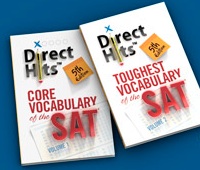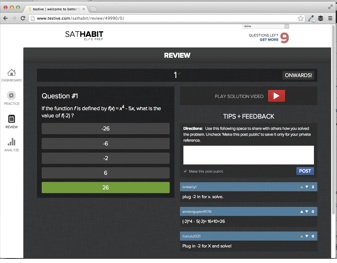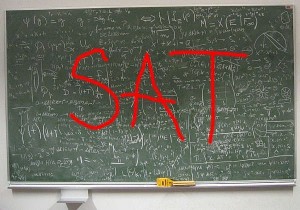Veritas Prep’s Shaan Patel Answers Five of the Most Commonly Asked Questions About How to Smartly Prepare For the SAT
 Do you have questions about the SAT? You’re not alone. For many students and families, the SAT is daunting. To help answer many of the most common questions about the SAT test, Shaan Patel, a perfect SAT score recipient and Director of SAT Programs at Veritas Prep, identified the five questions he’s most frequently asked and offers responses below:
Do you have questions about the SAT? You’re not alone. For many students and families, the SAT is daunting. To help answer many of the most common questions about the SAT test, Shaan Patel, a perfect SAT score recipient and Director of SAT Programs at Veritas Prep, identified the five questions he’s most frequently asked and offers responses below:
Q. Why do smart students struggle with the SAT?
The SAT is very different than the tests students take in their high school classes, but many think that if they are a solid A student, they don’t need to prepare for the SAT. That overconfidence is the number one reason students who normally do well academically post disappointing scores the first time they take the exam. The SAT rewards the prepared and it is absolutely an exam students can master with effective SAT prep. Students that spend time learning and practicing key strategies, reviewing grammar rules and vocabulary and taking practice tests will be much better positioned for success on test day.
Q. For students applying to competitive colleges and universities, is your GPA or SAT score more important?
When admissions officers look at GPA and SAT scores, only one is a standardized measure: the SAT. Grade point average has a high level of variability from school to school, which means it isn’t a consistent or standard measure with which to compare or evaluate applicants. So when it comes to college admissions, the four hours you spend taking the SAT is more important than the 4,000 hours you spend working on your GPA. Given that, whether you take an SAT course or prep on your own, you need to put considerable effort into preparing for the exam.
Q. When is the best time to take the SAT?
While many consider spring of junior year the best time to take the SAT, Veritas Prep actually recommends that students first take the exam during the winter of their junior year. The reason is simple – timing. Students that wait until spring of their junior year are preparing for the SAT, finals and often AP exams as well. Add in sports, extracurricular activities and a job, and that is a lot to handle. The best plan is to take the SAT in the winter when you have more time to dedicate to SAT preparation. A common argument is that you should wait to take the SAT until after you’ve completed algebra II, but the truth is, if you prep properly you’ll have command of the strategies you need to correctly solve SAT math questions, not to mention the rest of the exam.
Q. What’s the biggest misconception about the SAT?
The SAT is an unknown to a lot of people, so there are actually lots of misconceptions. The biggest misconception is that high school or AP classes are preparation enough for the SAT. Unfortunately, that just isn’t true. While AP classes can help on the SAT Subject tests, overall, the average high school curriculum is not designed with standardized college entrance exams in mind. The SAT tests different skills than what you learn in high school, and some properties of the exam even contradict what your teachers may have taught you. For example, English teachers emphasize quality over quantity when it comes to writing essays; however, on the SAT, the more you write on the essay, the higher you score. To get ready for the SAT, you’ll have to spend time preparing specifically for the exam in addition to your regular high school coursework.
Q. What is the best piece of advice you can give to students preparing for the SAT?
Practice, and practice only with official College Board SAT practice tests. The best way to prepare for the exam is to use questions produced by the folks who created it. The College Board releases a question of the day that you can sign up to receive by email, as well as makes several tests available at little or no cost. A College Board SAT practice test is also among the free SAT resources Veritas Prep offers on its website.
____________________________
Patel improved his SAT score from 1760 to a perfect 2400, earned more than $237,000 in scholarships and co-authored the Veritas Prep SAT 2400 program, which is available as a classroom course, live online, on demand in high definition or in private SAT tutoring sessions. Additionally, McGraw-Hill recently published his book, “SAT 2400 in Just 7 Steps.”
For more information, visit www.veritasprep.com/sat.
About Veritas Prep
Veritas Prep is the world’s largest privately-owned provider of test prep and admissions consulting services. It offers industry-leading programs to help applicants improve standardized test scores and gain admission to the world’s most selective universities. Founded in 2002 by graduates of the Yale School of Management, Veritas Prep offers its live classroom GMAT prep course in more than 90 cities worldwide and as an interactive online course available to students everywhere. Its Veritas Prep SAT 2400 course is available as a classroom course, live online, on demand or in private tutoring sessions and features the only zero risk, money back guarantee in the industry. In addition, Veritas Prep offers admissions consulting services for applicants seeking entry into competitive business schools, law schools, medical schools and other graduate programs. For more information, visit veritasprep.com.
 Every SAT coach and college professional will tell you that vocabulary is the key to every aspect of the college application process–from the SAT/ACT tests to writing the essay vocabulary plays an integral part. The Direct Hits SAT Vocabulary books address this issue by helping your student enrich their vocabulary. According to Direct Hits, “A rich and varied vocabulary enables us to speak more eloquently, describe more vividly, argue more compellingly, articulate more precisely, and write more convincingly.”
Every SAT coach and college professional will tell you that vocabulary is the key to every aspect of the college application process–from the SAT/ACT tests to writing the essay vocabulary plays an integral part. The Direct Hits SAT Vocabulary books address this issue by helping your student enrich their vocabulary. According to Direct Hits, “A rich and varied vocabulary enables us to speak more eloquently, describe more vividly, argue more compellingly, articulate more precisely, and write more convincingly.”









